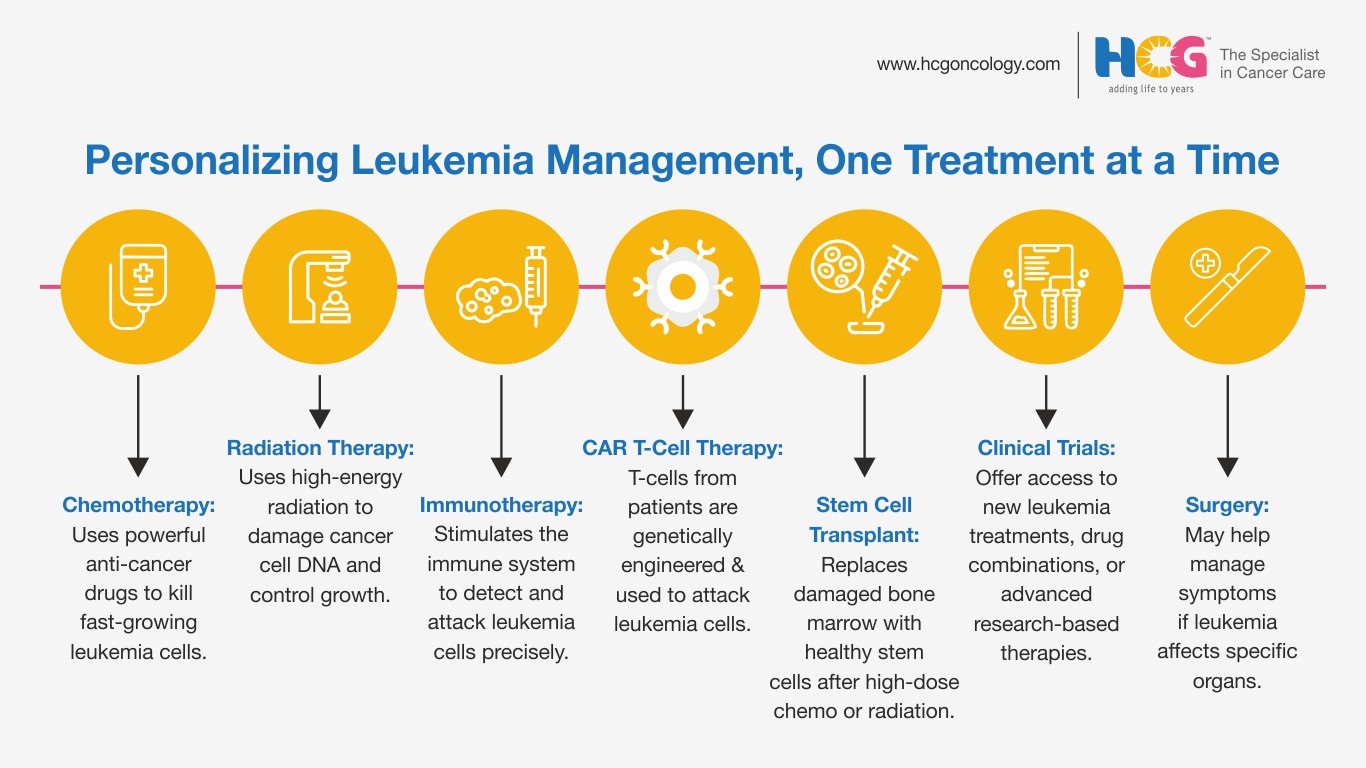
07 Nov, 2025
Feel free to reach out to us.

07 Nov, 2025

This article is medically reviewed by Dr. Amarnadh Polisetty, Consultant - Hematology and BMT Physician, HCG Cancer Centre, Vijayawada.
Leukemia is a cancer of blood cells. It is a type of blood cancer that affects blood and bone marrow and causes the production of abnormal white blood cells.
These white blood cells replace healthy blood cells and impair the body’s ability to fight off infections.
Leukemia treatment is a comprehensive process, and it depends on the type, stage, and the patient’s overall health.

Leukemia treatment depends on a myriad of factors. The following are the commonly recommended leukemia treatments:
Chemotherapy is the most common leukemia medication. It uses drugs to stop the growth of cancer cells. The administration of leukemia chemotherapy depends on the extent of the disease’s spread.
Radiation therapy for leukemia uses high-energy X-rays and other types of radiation to kill cancer cells.
Radiation therapy is often recommended in cases where the disease has spread to different parts of the body. It may also be used to prepare the body to receive a BMT or to manage symptoms in advanced stages.
It is often recommended along with other treatments to improve the overall effectiveness of the treatment.
Immunotherapy is another treatment for leukemia that involves re-engineering the patient’s immune system to fight cancer.
Unlike traditional leukemia medications such as chemotherapy, which directly attack cancer cells, immunotherapy works by boosting the immune system's ability to fight cancer. This treatment approach reduces damage to healthy tissues by precisely targeting the cancer cells.
CAR T-cell therapy is a revolutionary method for leukemia (blood cancer) treatment. CAR T-cell therapy for leukemia involves altering a patient’s T-cells in the laboratory to boost their ability to identify and attack cancer cells.
T-cells are taken from a patient’s blood, and a gene for a special receptor that binds to a certain protein on the surface of cancer cells is added to the T-cells in the laboratory. Later, these T-cells are infused back into the patient’s body, where they launch an attack against cancer cells. CAR T-cell therapy for leukemia has become especially effective for acute lymphoblastic leukemia (ALL) and chronic lymphocytic leukemia (CLL).
Stem cell transplantation, or bone marrow transplant, is an important leukemia treatment option for cancer patients.
Bone marrow transplantation for leukemia is a treatment procedure to replace damaged or diseased bone marrow with healthy bone marrow stem cells. Stem cells may be either collected directly from the bone marrow (bone marrow transplantation) or the bloodstream (peripheral stem cell transplantation).
Stem cell transplantation for leukemia does not usually work against cancer directly, but it restores the body's ability to produce new blood cells after treatment with very high doses of chemotherapy or other treatments, such as radiation therapy, that are used to destroy cancer cells.
Read More: Different Types of Bone Marrow Transplant for Blood Cancers
Clinical trials for the treatment of leukemia are important for advancing the development of leukemia drugs and new medicines for leukemia.
Clinical trials involve testing new therapies, leukemia drug combinations, or techniques to find more effective approaches to leukemia treatments.
For some patients, especially those who have exhausted their treatment options, joining a clinical trial can be a leukemia treatment option.
Surgery for leukemia treatment is not very common, since leukemia is a blood cancer that affects the bone marrow and blood cells.
However, it may be recommended in advanced stages when the disease has spread to other organs to manage symptoms and improve the quality of life.
Side effects of leukemia treatment depend on the type of treatment used.
Short-term side effects include fatigue, nausea, hair loss, and skin irritation. Long-term side effects of leukemia, on the other hand, include fertility problems, secondary cancers, and cognitive issues.
Some common side effects of leukemia treatment are:
Choosing HCG Cancer Centre for leukemia treatment offers patients access to advanced treatments and personalized care from a team of expert oncologists.
As a leading cancer hospital in India, HCG provides state-of-the-art therapies, including chemotherapy, immunotherapy, targeted therapy, and stem cell transplants, ensuring the best possible outcomes for leukemia treatment.
Our commitment to the latest medical advancements, including clinical trials and cutting-edge treatments, ensures that patients receive the most effective and innovative care. We work closely with patients and their families to tailor leukemia treatments to each patient’s individual health needs, providing comprehensive support throughout the journey of treatment for leukemia.
Leukemia treatment requires a comprehensive approach utilizing the latest advancements in leukemia medications and leukemia drugs. The options may vary depending on the type and stage of leukemia. Understanding how to treat leukemia and having access to the latest advancements in leukemia medications and other disease management approaches ensure that patients have the best chance for improved quality of life and long-term survival.

Dr. Amarnadh Polisetty
Consultant - Hematology and BMT Physician
MBBS, MD (General Medicine), DNB (Clinical Hematology)
Dr. Amarnadh is an experienced hematologist and BMT specialist who is available for consultations at HCG Cancer Centre, a leading cancer hospital in Vijayawada. He is well-trained in the comprehensive management of pediatric and adult hematological and oncological disorders. His expertise extends to the management of thrombophilia disorders and the management of hematological disorders in cardiac OTs and cardiac ICUs. He is certified in National Cardiac Life Support (affiliated with the American Heart Association). He combines the latest evidence-based treatments with a compassionate approach to ensure that patients are well-informed and receive the best possible care.
To book an appointment: Book an Appointment with Dr. Amarnadh Polisetty.